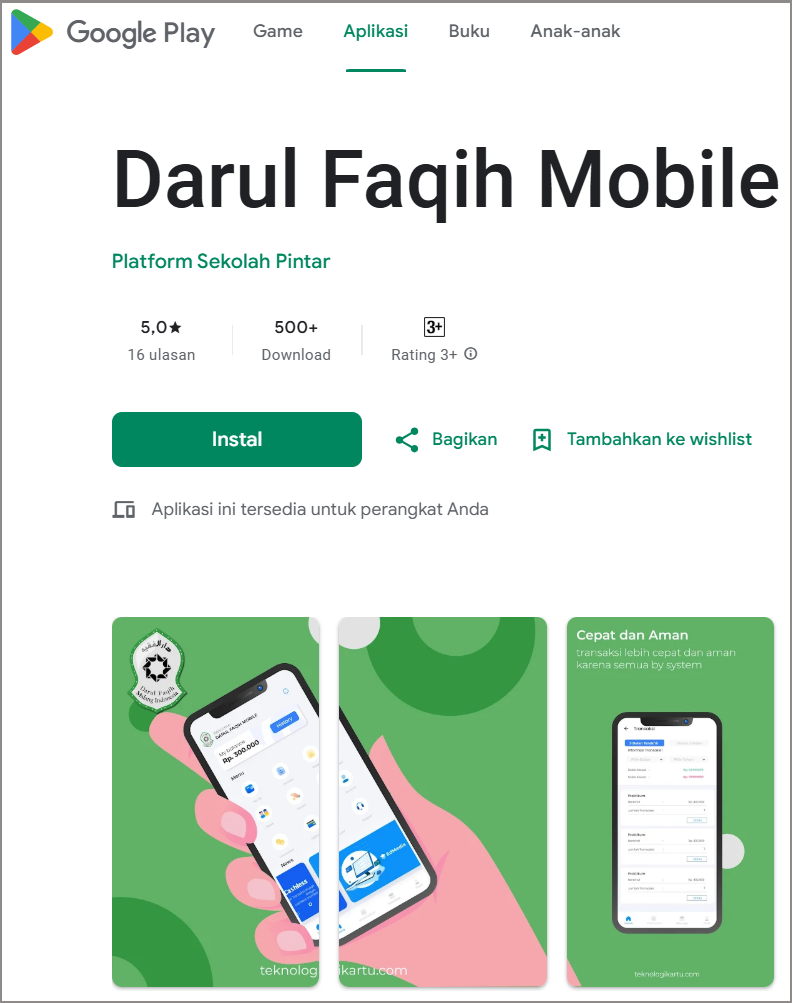Digitizing Darul Faqih Islamic boarding school in Indonesia: Teachers' perspectives on hybrid Islamic boarding school
 Abstract views: 275
,
Abstract views: 275
,
 PDF downloads: 111
PDF downloads: 111
Abstract
The COVID-19 pandemic has impacted the closure of almost all learning processes in Islamic boarding schools. Only some Islamic boarding schools have succeeded in modifying learning methods, one of which is the Darul Faqih Indonesian Islamic Boarding School located in Malang Regency, Indonesia. This community service aims to support efforts to strengthen the digitalisation of Darul Faqih Indonesian Islamic boarding school and direct the development of hybrid Islamic boarding schools after the Covid-19 pandemic. This community service activity consists of two phases. First, at the beginning of the semester, teachers are given training to strengthen the use of learning management systems and mobile apps. In the second phase, the teacher was invited back to conduct a focus group discussion at the end of the implementation. At the end of this service activity, impact measurements were also carried out from a teacher's perspective. A total of 58 teachers participated in this activity. Less than half of teachers have a preference for mixed learning. However, they have high self-efficacy in implementing effective learning to support the implementation of hybrid pesantren. Constraints during mixed learning are appropriate technological and pedagogical support. Despite some challenges, teachers have so far been able to adapt to various online learning methods. Most agree that blended learning can be next as the next main effort towards hybrid pesantren.
[Pandemi Covid-19 berdampak pada penutupan hampir semua proses pembelajaran di pondok pesantren. Hanya sebagian pondok pesantren yang berhasil memodifikasi metode pembelajaran, salah satunya adalah Pondok Pesantren Darul Faqih Indonesia yang berlokasi di Kabupaten Malang, Indonesia. Pengabdian masyarakat ini bertujuan untuk memberikan dukungan dalam upaya penguatan digitalisasi pesantren Darul Faqih Indonesia dan mengarahkan pada pembangunan pesantren hibrid pasca pandemi Covid-19. Kegiatan pengabdian masyarakat ini terdiri dari dua fase. Pertama, pada awal semester, guru diberikan pelatihan untuk penguatan penggunaan learning manajemen system dan mobile app. Fase kedua, di akhir penerapan, guru diundang kembali untuk melakukan Focus Group Discussion. Di akhir kegiatan pengabdian ini juga dilakukan pengukuran dampak berupa perspektif guru. Sebanyak 58 guru berpartisipasi dalam kegiatan ini. Kurang dari separuh guru yang memiliki preferensi terhadap pembelajaran campuran. Namun, mereka memiliki efikasi diri yang tinggi dalam melaksanakan pembelajaran yang efektif untuk mendukung implementasi pesantren hibrid. Kendala selama pembelajaran campuran adalah dukungan teknologi dan pedagogi yang tepat dan sesuai. Meskipun ada beberapa tantangan, guru sejauh ini mampu beradaptasi dengan berbagai metode pembelajaran daring, dan mayoritas setuju bahwa pembelajaran campuran dapat diterapkan selanjutnya sebagai upaya utama menuju pesantren hibrid.]
Downloads
References
Amir, L. R., Tanti, I., Maharani, D. A., Wimardhani, Y. S., Julia, V., Sulijaya, B., & Puspitawati, R. (2020). Student perspective of classroom and distance learning during COVID-19 pandemic in the undergraduate dental study program Universitas Indonesia. BMC Medical Education, 20(1), 392. https://doi.org/10.1186/s12909-020-02312-0
Choiru, M. (2019). Penerapan Learning Management System pada Pembelajaran Zakat Wakaf Melalui Aplikasi Schoology.Com Sebagai Alternatif Peningkatan Budaya Baca bagi Mahasiswa pada Prodi Hukum Bisnis Syari’ah Universitas Trunojoyo Madura. Proceeding of International Conference on Islamic Education: Challenges in Technology and Literacy. Presented at the International Conference on Islamic Education, Faculty of Education and Teacher Training, 245–252. Malang: Universitas Islam Negeri Maulana Malik Ibrahim Malang.
Dhawan, S. (2020). Online Learning: A Panacea in the Time of COVID-19 Crisis. Journal of Educational Technology Systems, 49(1), 5–22. https://doi.org/10.1177/004723952093 4018
Djalante, R., Lassa, J., Setiamarga, D., Sudjatma, A., Indrawan, M., Haryanto, B., … Warsilah, H. (2020). Review and analysis of current responses to COVID-19 in Indonesia: Period of January to March 2020. Progress in Disaster Science, 6, 100091. https://doi.org/10.1016/j.pdisas.2020.100091
Fauzi, N. B., & Wan Khairuldin, W. M. K. F. (2017). The Readiness of Usage Mobile Learning (M-Learning) towards the Qur’an Learning in Islamic Studies Course among the Students in Unisza, Terengganu. International Journal of Academic Research in Business and Social Sciences, 7(4), 32–43. https://doi.org/10.6007/IJARBSS/v7-i4/2777
Firdaus Wan Khairuldin, W. M. K., Yusof, M. Y. Z. M., Abdul Rahman, M. N., Mat Deris, M. S., Rahman, A. A., Adam, F., … Fauzi, N. (2017). Learning Al-Quran Based on the Mobile Learning (M-Learning): A Literature Review. International Journal of Academic Research in Business and Social Sciences, 7(4), 70–80. https://doi.org/10.6007/IJARBSS/v7-i4/2780
Hanafi, Y., Hendrawan, H. J., & Hakim, I. N. (2019). Accelerating Qurán Reading Fluency through Learning Using QURÁNI Application for Students with Hearing Impairments. International Journal of Emerging Technologies in Learning (IJET), 14(06), 110. https://doi.org/10.3991/ijet.v14i06.9863
Hanafi, Y., Ikhsan, M.A., Saefi, M., Diyana, T.N., Arifianto, M. L., (2021). Pendidikan Agama Islam di Masa Pandemi Covid-19: Tantangan dan Respon. Sidoarjo: Delta Pijar Khatulistiwa.
Hanafi, Y., Murtadho, N., Ikhsan, M. A., & Diyana, T. N. (2020). Reinforcing Public University Student’s Worship Education by Developing and Implementing Mobile-Learning Management System in the ADDIE Instructional Design Model. International Journal of Interactive Mobile Technologies (IJIM), 14(02), 215. https://doi.org/10.3991/ijim. v14i02.11380
Hanafi, Y., Murtadho, N., Ikhsan, M. A., Diyana, T. N., & Sultoni, A. (2019). Student’s and Instructor’s Perception toward the Effectiveness of E-BBQ Enhances Al-Qur’an Reading Ability. International Journal of Instruction, 12(3), 51–68. https://doi.org/10.29333/ iji.2019.1234a
Hanafi, Y., Taufiq, A., Saefi, M., Ikhsan, M. A., Diyana, T. N., Hadiyanto, A., … Hidayatullah, M. F. (2023). Indonesian Ulema Council Fatwa on Religious Activities During the COVID-19 Pandemic: An Investigation of Muslim Attitudes and Practices. Journal of Religion and Health, 62(1), 627–649. https://doi.org/10.1007/s10943-022-01639-w
Hanafi, Y., Taufiq, A., Saefi, M., Ikhsan, M. A., Diyana, T. N., Thoriquttyas, T., & Anam, F. K. (2021). The new identity of Indonesian Islamic boarding schools in the “new normal”: the education leadership response to COVID-19. Heliyon, 7(3), e06549. https://doi.org/10.1016/j.heliyon.2021.e06549
Hoque, M., Yusoff, A. M., Toure, A. K., & Mohamed, Y. (2019). Teaching Hadith Subjects through E-Learning Methods: Prospects and Challenges. International Journal of Academic Research in Progressive Education and Development, 8(2), 507–514. https://doi.org/10.6007/IJARPED/v8-i2/6164
Hrastinski, S. (2019). What Do We Mean by Blended Learning? TechTrends, 63(5), 564–569. https://doi.org/10.1007/s11528-019-00375-5
Ibrohim, Sudrajat, A. K., & Saefi, M. (2021). Assessing Indonesian teacher’s perspective on the ımplementation of distance learning due to COVID-19 based on online survey. Journal of Turkish Science Education, 18(Covid-19 Special Issue), 46–59. https://doi.org/10.36681/tused.2021.71
Kumar, R., & Selva Ganesh, R. (2022). Dealing with online and blended education in India. DECISION, 49(2), 195–201. https://doi.org/10.1007/s40622-022-00320-1
Maatuk, A. M., Elberkawi, E. K., Aljawarneh, S., Rashaideh, H., & Alharbi, H. (2022). The COVID-19 pandemic and E-learning: challenges and opportunities from the perspective of students and instructors. Journal of Computing in Higher Education, 34(1), 21–38. https://doi.org/10.1007/s12528-021-09274-2
Mustofa, M., Ahmadi, R., & Karimullah, I. W. (2020). Islamic Character Education in E-Learning Model: How Should It be Implemented? Jurnal Sains Sosio Humaniora, 4(1), 89–93. https://doi.org/10.22437/jssh.v4i1.9771
Pratt, K., & Kovatcheva, E. P. (2018). Designing Blended, Flexible, and Personalized Learning. In J. Voogt, G. Knezek, R. Christensen, & K. W. Lai (Eds.), Primary and Secondary Education, Springer International Handbooks of Education (pp. 1–18). Springer International Publishing. https://doi.org/10.1007/978-3-319-53803-7_49-1
Ravat, S., Barnard-Ashton, P., & Keller, M. M. (2021). Blended teaching versus traditional teaching for undergraduate physiotherapy students at the University of the Witwatersrand. South African Journal of Physiotherapy, 77(1), 1544. https://doi.org/10.4102/sajp.v77i1.1544
Suwannaphisit, S., Anusitviwat, C., Tuntarattanapong, P., & Chuaychoosakoon, C. (2021). Comparing the effectiveness of blended learning and traditional learning in an orthopedics course. Annals of Medicine and Surgery, 72, 103037. https://doi.org/10.1016/j.amsu.2021.103037
Weldy, T. G. (2018). Traditional, Blended, or Online: Business Student Preferences and Experience with Different Course Formats. E-Journal of Business Education & Scholarship of Teaching, 12(2), 55–62. https://doi.org/https://files.eric.ed.gov/fulltext/EJ1193431.pdf

Copyright (c) 2025 PERDIKAN (Journal of Community Engagement)

This work is licensed under a Creative Commons Attribution-NonCommercial 4.0 International License.
In order for PERDIKAN to publish and disseminate research articles, we need publishing rights. This is determined by a publishing agreement between the author and PERDIKAN. This agreement deals with the transfer or license of the copyright to PERDIKAN and authors retain significant rights to use and share their own published articles. For both subscription and open access articles, published in proprietary titles, PERDIKAN is granted the following rights:
- The right to provide the article in all forms and media so the article can be used on the latest technology even after publication.
- The authority to enforce the rights in the article, on behalf of an author, against third parties, for example in the case of plagiarism or copyright infringement.
Copyright aims to protect the specific way the article has been written to describe an experiment and the results. PERDIKAN is committed to its authors to protect and defend their work and their reputation and takes allegations of infringement, plagiarism, ethic disputes and fraud very seriously.
If an author becomes aware of a possible plagiarism, fraud or infringement we recommend contacting their PERDIKAN publishing contact who can then liaise with our in-house legal department. Note that certain open access user licenses may permit


1.png)


1.png)


